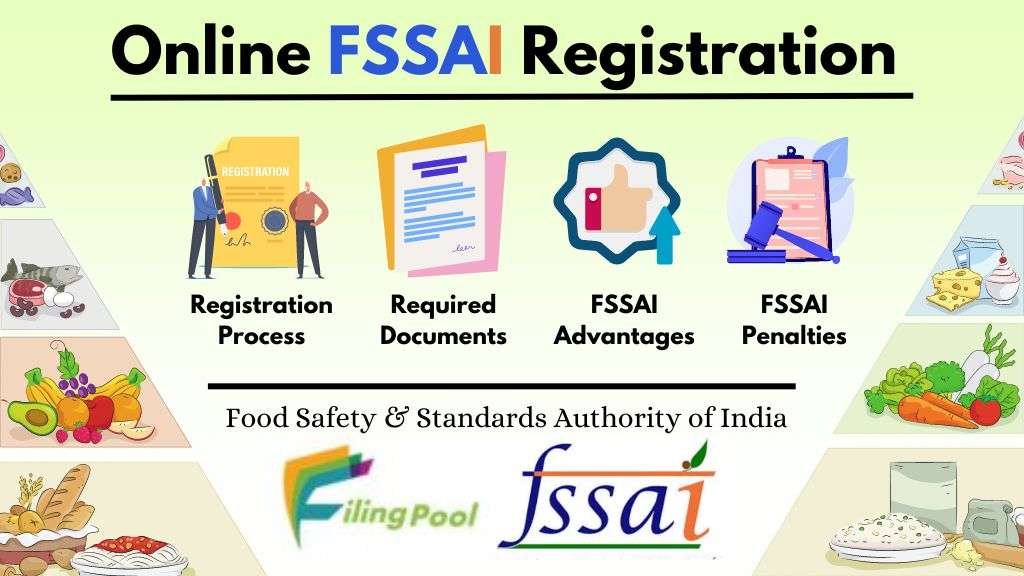Food safety is of paramount importance for the well-being of consumers, and to ensure the quality and safety of food products, the Food Safety and Standards Authority of India (FSSAI) was established. FSSAI is the apex authority responsible for regulating and supervising the food safety standards in India. Any entity involved in the manufacturing, storage, distribution, and sale of food products must obtain FSSAI registration or license to operate legally. In this blog, we will delve into the FSSAI registration process, the documents required, the benefits of obtaining FSSAI registration, and the penalties for non-compliance.
FSSAI Registration Process:
The FSSAI registration process can be completed through online or offline modes. Online registration has become more popular due to its convenience and efficiency. Many service providers, such as Filing Pool, offer online FSSAI registration services in Delhi and all across India. Here are the steps involved in the FSSAI registration process:
-
Determine the Type of FSSAI Registration:
FSSAI offers three types of registration depending on the scale of the business and the size of the food business operator (FBO). These are:
- Basic Registration: For FBOs with an annual turnover of up to Rs. 12 lakhs.
- State License: For small to medium-sized FBOs with an annual turnover between Rs. 12 lakhs and Rs. 20 crores.
- Central License: For large-sized FBOs with an annual turnover above Rs. 20 crores or for those who operate in multiple states.
-
Prepare the Required Documents:
The necessary documents for FSSAI registration may vary depending on the type of registration and the specific FBO. However, common documents include:
- Identity proof of the proprietor or partners or directors.
- Address proof of the business premises.
- A passport-sized photograph of the FBO.
- Proof of possession of the premises (e.g., rental agreement or utility bill).
- List of food products to be dealt with.
- Certificate of incorporation (for companies).
- Food safety management system plan.
- NOC from the manufacturer (in case of re-labellers and re-packers).
- Supporting documents as required for specific types of FBOs.
-
Filing the Application:
With all the required documents in place, the FBO can apply for FSSAI registration through the FSSAI website or through authorized online service providers like Filing Pool. The application form should be duly filled, and the necessary fees should be paid.
-
Verification and Issuance:
Once the application is submitted, FSSAI will verify the provided information and documents. After successful verification, the FBO will receive the FSSAI registration certificate with a unique registration/license number, which must be displayed on all food products and at the place of business.
Benefits of Obtaining FSSAI Registration:
FSSAI registration offers numerous advantages to food business operators, and it is essential to understand the benefits of compliance with food safety regulations. Some of the key benefits are:
-
Legal Compliance:
FSSAI registration is a legal requirement to operate a food business in India. Compliance with FSSAI regulations ensures that your business operates within the confines of the law, avoiding potential legal issues and penalties.
-
Consumer Trust:
FSSAI registration symbolizes that your food products meet the prescribed safety and quality standards. This instills confidence in consumers about the safety of the products they purchase, leading to increased trust and loyalty.
-
Business Expansion:
FSSAI registration is crucial for expanding your food business. It is often a prerequisite for getting loans, investments, or approvals for setting up new food establishments.
-
Quality Assurance:
The FSSAI regulations set guidelines for food safety, hygiene, and labeling. By complying with these standards, FBOs ensure the quality and safety of their products, safeguarding the health of consumers.
-
Access to New Markets:
FSSAI registration can enable FBOs to access new markets and export opportunities, as many foreign countries require FSSAI compliance for importing food products.
Penalties for Non-Compliance:
Non-compliance with FSSAI regulations can attract severe penalties and consequences. Some of the common penalties include:
-
Financial Penalties:
FBOs found operating without FSSAI registration or license or violating food safety norms can face hefty fines, which may vary depending on the nature and severity of the offense.
-
Product Seizure:
Non-compliant food products may be seized and destroyed by the authorities to protect public health.
-
Business Closure:
In extreme cases of repeated violations, the FSSAI may order the closure of the food business.
-
Legal Prosecution:
Non-compliance with FSSAI regulations can lead to legal prosecution, resulting in imprisonment for the responsible individuals or entities.
Conclusion
Obtaining FSSAI registration is not only a legal obligation but also a strategic step towards ensuring the safety and quality of food products. Filing Pool, offer online FSSAI registration services in Delhi and all across India. Compliance with FSSAI regulations can boost consumer trust, facilitate business expansion, and open up new market opportunities. On the other hand, non-compliance can result in severe penalties and damage to the reputation of the food business. Therefore, it is imperative for all food business operators to adhere to the FSSAI registration process and maintain food safety standards to contribute to a healthier and safer food ecosystem in India.

